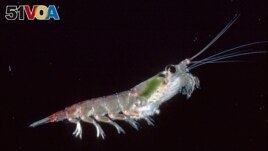Antarctic krill, a relative of shrimp and crabs, are only a few centimeters in size. But scientists say they are important to the area's food web, including food for some of the Earth's largest animals, whales.
Fishing ships in the Antarctic gather krill for use as food in an increasing number of products. That has activists concerned.
Alistair Allan is an activist with the Bob Brown Foundation, an Australian environmental group with ties to the country's Green Party. Allan said he was worried the ship activity could harm the whales: "You have the ships almost running into whales feeding on the same things they're fishing."

This photo provided by the British Antarctic Survey shows an Antarctic krill (Euphausia suberba). (Chris Gilbert/British Antarctic Survey)
Krill fishing is banned in U.S. waters because of concerns it could affect whales, seals and other sea animals. But krill fishing has gone on for about 60 years. It is believed to have started when the former Soviet Union sent an industrial fleet to the Antarctic in search of a supply of high-protein food.
Demand has increased over the years. Krill is used a lot in the fish farming industry. They are also used in nutritional supplements, pet food and other high-protein foods.
The Associated Press reports that 10 to 12 ships, mainly from Norway and China, head to the South Orkney Islands, to fish for krill each December. Fishing countries agreed to a catch limit under a conservation agreement. In 2022, that level was about 416,000 metric tons.
A coalition of countries led by the U.S. has called for additional restrictions. The coalition says krill is important to other animals. It also says that krill removes greenhouse gases from the atmosphere. However, China and Russia have opposed efforts to put in place new restrictions.
There are reports that the krill boats are a danger to whales. In addition to that, a study from the University of California, Santa Cruz found that pregnancy rates among humpback whales in Antarctica have fallen sharply. The reason, it said, might be a lack of krill.
Also, research published by the World Wildlife Fund, a Swiss conservation group, says that krill remove 23 million tons of carbon dioxide from the atmosphere. The research suggests that krill do this by eating phytoplankton, microscopic forms of life that make food from sunlight and carbon dioxide.
Emma Cavan is a biologist at Imperial College London. She helped write the report. She said: "Antarctic krill are worth more to nature and people left in the ocean…"
More rules for krill harvesting
The Commission for the Conservation of Antarctic Marine Living Resources, or CCAMLR, is an international body with 27 member states established in 1982. The group, based in Tasmania, Australia, makes rules for conservation issues like krill fishing.
But some supporters of the group say it has to consider climate change in its rules.
Clair Christian is head of the Antarctic and South Ocean Coalition, a nonprofit group based in Washington, D.C. Her group represents environmental groups at CCAMLR meetings. Christian told the AP that CCAMLR is supposed to support conservation, "It's not to enable fishing," she said.
The Australia-based Association of Responsible Krill harvesting companies (ARK) represents members who harvest 90 percent of the Antarctic krill. Members accepted self-imposed restrictions in 2018.
The group has agreed to place stronger rules on moving krill between ships and to study the effects of climate change on krill.
But the group says its catch limits should be higher. It noted that its members catch less than one percent of the estimated 60 million metric tons of krill found in the main Antarctic fishing grounds. That leaves 99 percent for whales and other animals.
Activists, however, are calling for reform. Helena Herr studies whales at the University of Hamburg, in Germany. Herr briefly served in an advisory position with the ARK group. She believes krill fishing should be banned. She said she did not trust the estimates of the amount of krill in the Antarctic.
"The data is based on such vague assumptions that we don't really know what we're doing," she said.
I'm Mario Ritter. And I'm Gena Bennett.
Joshua Goodman and David Keyton reported this story for the Associated Press. Mario Ritter, Jr. adapted it for VOA Learning English.
________________________________________________
Words in This Story
food web –n. the interconnected system of animals and plants that provide food and nutrients
conservation –v. the preservation and management of animals, plants, and natural resources for the present and the future
self-imposed –adj. a requirement placed on yourself; a requirement that a group places on itself instead of having an outside group place requirements on it
vague –adj. lacking details or clarity; something that could mean anything
